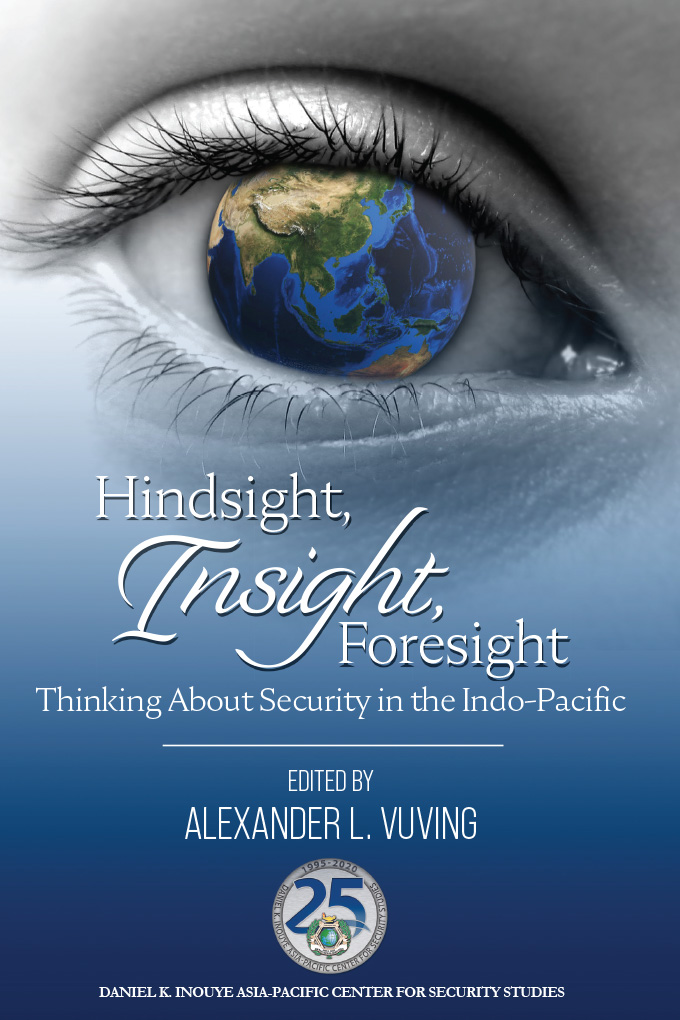Summary:
As part of the Daniel K. Inouye Asia-Pacific Center for Security Studies 25th Anniversary, the Center created this publication, “Hindsight, Insight, Foresight: Thinking about Security in the Indo-Pacific,” to highlight important issues in the Indo-Pacific region. This book provides a tour d’horizon of the most consequential issues that are defining the global and regional security landscape in the Indo-Pacific. With hindsight, insight, and foresight in each of its chapters, the book offers a perspective to see this landscape in its dynamic making and re-making.
Edited by Dr. Alexander L. Vuving, the book is written by 20 authors who are current and former faculty members, visiting academics, and research fellows at DKI APCSS. The book contains 21 substantive chapters that address a full spectrum of topics ranging from:
- the rise of China;
- the strategic competition among the great powers;
- the nexus between security and technology;
- the quest of individuals and groups and nations for resources, rights, power, and places in the international system;
- the question of war and peace;
- the architecture of regional security; to
- the major issues of governance in response to the challenges and opportunities of the 21st century.
Although DKI APCSS is a U.S. organization, several of our authors are non-U.S. nationals and, more importantly, this book deliberately avoids U.S.-centrism. The authors have been encouraged to take a broad regional or global perspective that would allow them to make their discussion relevant to as many security practitioners and analysts in the contemporary world as possible.
Taking the evolutionary perspective, each chapter of the book situates the topic of its study in the grand scale of time in order to mine lessons from the past and draw implications for the future. These hindsight and insights, then, enable the authors to look far into the future and make policy recommendations for the security practitioners of today.
Table of contents
Foreword
Rear Admiral Peter A. Gumataotao, USN (Ret)
Director, Daniel K. Inouye Asia-Pacific Center for Security Studies
Introduction
Alexander L. Vuving
Part I: Understanding the Big Picture
- Philosophy and Policy: Why Ideas Will Drive the Indo-Pacific
Scott D. McDonald - Great Power Competition: Lessons from the Past, Implications for the Future
Alexander L. Vuving - The Fourth Industrial Revolution and Its Discontents: Governance, Big Tech, and the Digitization of Geopolitics
Virginia Bacay Watson - Surveillance Technology Challenges Political Culture of Democratic States
Inez Miyamoto
Part II: The Changing Faces of Regional Security
- Political Violence South Asia, 1995-2020
Shyam Tekwani - Twenty Five Years of Terrorism and Insurgency in Southeast Asia
Sam Mullins - The Evolution of the U.S. Alliance System in the Indo-Pacific since the Cold War’s End
John Hemmings - Underwater Competition in the Indo-Pacific
Mizuho Kajiwara - Illegal, Unreported, and Unregulated Fishing and the Impacts on Maritime Security
Ben Crowell and Wade Turvold
Part III: Local Dynamics of Regional Security
- Russia in the Pacific: Strategic Opportunity in the Far East
Wade Turvold - The Future of the Republic of Korea and United States Alliance: Fix It or Lose It
James M. Minnich - The Fang-Shou Cycle in Chinese Politics
Sungmin Cho - Are India and China Destined for War? Three Future Scenarios
Srini Sitaraman - Has Myanmar Become China’s Back Door to the Indian Ocean?
Miemie Winn Byrd - Taiwan’s Fight for International Space
Michael C. Burgoyne
About the Authors
Index






